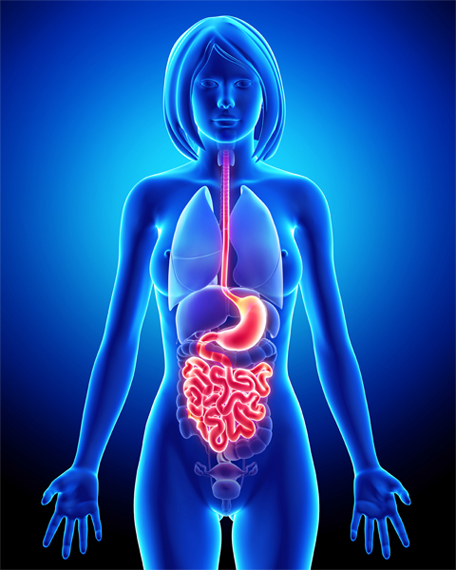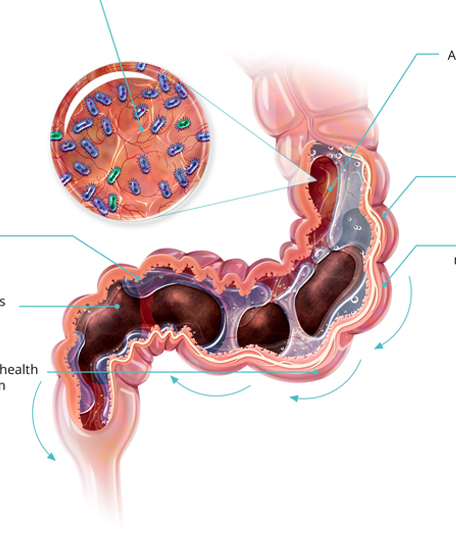5 ways fecal impaction symptoms
can trick you
Studies have revealed that not only are fecal impaction complications a common reason for emergency room visits, by the time the patient gets to the emergency department they face significantly high mortality rates. This tells us that most fecal impaction sufferers never see the medical emergency coming their way and that’s because fecal impactions have the tendency to mislead the sufferer.
Here are 5 ways your fecal impaction symptoms could be deceiving you…

Ways #1
Much of the gut damage caused by a fecal impaction is silent, so you shouldn’t take the lack of symptoms to mean that you are safe from a sudden complication
From the moment a large fecal mass gets lodged tightly in your digestive tract, your gut tissue begins to quickly breakdown from the inside-out. The extreme, prolonged stretching of your gut first causes inflammation in the sensitive mucosal lining of your intestine which then grows into deeper sores and ulcerations. As this inflammatory damage progresses, the delicate blood vessels, enteric nerves and the smooth muscles around your gut all experience increasingly severe damage. Eventually the gut wall begins to lose its structural integrity and your gut becomes vulnerable to developing a tear.
All of this typically happens without triggering any obvious symptoms in the sufferer. The only time when you might notice that something is seriously wrong is when a sudden complication, such as a bowel perforation, occurs.
Remember, a fecal impaction is a long-term and recurring condition. The internal damage it causes lingers long after you manage to pass your stools and this damage tends to grow with each new constipation or fecal impaction episode. This is why it is so critical to treat your fecal impaction as an urgent health matter even if you don’t have any symptoms and even if you are not currently constipated.

Ways #2
When the symptoms are present, they are often vague, which can trick you into thinking the problem is mild where in fact it is far more serious
While our body is good at sensing things on the outside (our skin, mouth, nose, eyes), when it comes to our internal organs, our sensory faculties are very dull. This is why sensations that arise from our digestive system tend to be very generalized and ambiguous.
The truth is, your digestive tract can be stretched tight to the point of almost tearing and still only produce very mild or indistinct sensations. That’s why it is so critical to not be fooled by how bearable or insignificant your symptoms may seem because those mild symptoms may be your only clue to the ongoing and serious damage inside. As a rule, always be aware that the longer you remain impacted, the greater your chances of developing a complication regardless of what your symptoms lead you to believe.

Ways #3
Even when the symptoms seem to be clear, they can trick you into using the wrong treatments
It may seem counterintuitive but one of the hallmarks of a severe impaction is sudden diarrhea and rectal leakage. That’s because when you develop an impaction, the obstructed fecal mass can cause a buildup of liquid stool behind it. When the pressure of this liquid stool buildup gets high enough, it can suddenly slip past the hard fecal mass, causing unexpected diarrhea. When most fecal impaction sufferers are first confronted with this kind of fecal incontinence, their first instinct is to treat it with antidiarrheal medication which can actually make the problem worse by further slowing down your bowels. Research shows that even doctors are liable to make this common mistake. This goes to show how truly devious a fecal impaction can be. It also underscores why your goal should be to treat the underlying cause of your fecal impaction rather than its individual symptoms.

Ways #4
Fecal impaction symptoms can seem completely unrelated to your digestive function
One of the things that makes a fecal impaction so dangerous is that its damage can extend far beyond your digestive tract. Our abdominal cavity is so tightly packed with various organs that an impaction can harm those abdominal organs through something known as the “mass effect”. Essentially, an enlarged stool that is stuck in your colon can protrude into a nearby structure and interfere with its function or even damage it. For example, a fecal mass can push against your bladder, ureter or urethra and obstruct the flow of urine. This can end up causing urinary tract infections and even kidney damage, two problems you may not even realize were being caused by your fecal impaction
Similarly, an impacted stool can cause injury to your liver, spleen and even your lungs. There is also evidence that the long-term gut impairment caused by fecal impactions can affect your emotional health, thinking abilities, energy levels, aging process and even your life expectancy. The fact that a fecal impaction can sit at the center of all these damaging effects and yet still go so unnoticed reveals its true threat potential. The only way to protect yourself from all these dangers of a fecal impaction is to realize it can harm you in ways that are hard to connect to an obstructed gut. Equally important is to use a multi-pronged treatment strategy that not only resolves your fecal impaction quickly but also prevents it from recurring and helps repair any lasting internal damage it may have left behind.

Ways #5
Fecal impaction symptoms can actually get milder even as its damage to your gut grows worse
When it comes to fecal impactions, the severity of your symptoms is not a good indicator of the severity of your condition. In other words, your symptoms can seem to ease up just as the damage progresses to an advanced stage. Take for instance the common symptom of feeling “full” or “backed-up” when an impacted stool is lodged in your rectum. The extreme stretching of your rectal canal can eventually cause the surrounding nerves to experience compression damage. Among the nerves that experiences this kind of damage is the pudendal nerve which is responsible for helping you sense when your rectum is full. As the pudendal nerve continues to experience neuropathy, you ultimately lose the ability to tell when it’s time to go to the bathroom.
This is why it is so common for people with extensive fecal impaction damage to go from constantly feeling the urge to pass stools to suddenly losing this urge altogether. From the sufferer’s point of view this easing of the symptoms may seem like the problem has some how gotten better on its own but in reality the damage has crossed a critical threshold. Without the ability to sense when a stool is stretching your rectum, you are likely to go long
periods without having a bowel movement and your rectal canal is likely to get over-filled with stool. You are now essentially trapped in a dangerous cycle where rectal over-filling causes more damage to the pudendal nerve and pudendal nerve damage causes more stool to collect in the rectum. This vicious cycle continues until it eventually results in a major complication. This shows how a fecal impaction can mislead you by taking away your ability to sense the internal damage just as you get close to a medical emergency. This is why you should always consider an impaction as extremely dangerous even if your symptoms make it seem like your situation is improving.
As you can see, part of the danger of a fecal impaction is how it deludes the sufferer into either taking the wrong action or not taking any action at all while the condition continues its destructive course uninterrupted. The only way to avoid all the dangers of a fecal impaction is to never ignore it and to be proactive in treating it properly.
Now that you’re aware of all the ways your fecal impaction can mislead you, it’s time to take a look at what exactly causes a fecal impaction to happen in the first place. There are 11 different initial causes of fecal impaction that can trigger your gut to develop a long-term disorder, resulting in your stools getting stuck over and over again. Let’s take a look at these 11 causes and see which one’s may have contributed to your fecal impaction.



